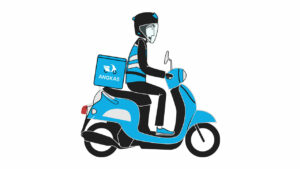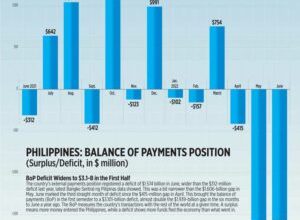Angkas offers to share pioneering standards with new entrants

By Miguel Hanz L. Antivola
ANGKAS, a pioneer in the motorcycle taxi industry, is ready to share the standards it has developed with emerging competitors, recognizing the importance of collaboration for industry growth, according to its chief executive officer.
“I know that from the outside, this is potentially a lucrative business for everyone,” said George I. Royeca, Angkas CEO and co-founder, in an interview with BusinessWorld. “I do invite people to improve on it.”
“But let’s make sure that the intention is there — to improve the industry,” he added.
Angkas, Mr. Royeca also said, has shared all of its proprietary knowledge with competitors, from training modules to insurance products.
“Hopefully we create more standards and share it with everyone else,” he said.
“At the end of the day, the more people who are in the space trying to compete, it will improve the market as long as standards are maintained.”
HOW IT STARTED
Personal recreational activities that unveil opportunities in the market have the potential to ignite a meaningful social cause to champion.
“I was always a [motorcycle] rider for fun and recreation,” Mr. Royeca said. “I don’t think anybody sets out to do an advocacy… I have to admit that was far from mind.”
“The business side of it is what made me take a look and start; the advocacy keeps me moving forward,” he added.
In 2016, when Angkas was founded, 2.5 million vehicles filled the road network of Metro Manila, according to the Inter-Agency Council on Traffic. This increased to 3.2 million in 2021.
In the 2022 report of TomTom’s Global Traffic Index, Manila was ranked second globally with an average travel time of 24 minutes and 30 seconds per 10 kilometers. This represented an increase of one minute and 20 seconds compared to 2021.
There are around 18 million motorcycles being used on the roads, according to the Land Transportation Office. For Mr. Royeca, exploring the potential of these motorcycles and their owners can lead to improved alternatives.
The company aims to address these challenges by professionalizing the informal sector of habal-habal or motorcycles for hire, he said, highlighting that this mode of transportation has been prevalent not only in his hometown in Mindanao but also in other countries.
A challenge was the establishment of new safety standards and regulations for motorcycle taxis.
“When you’re young and you have a great idea, you don’t really know the implications of that idea,” Mr. Royeca said, reflecting on the solutions brought together by Angkas.
“From both the operational perspective and the public mindset, we ensured that we professionalized the product and made it genuinely safe for everyone,” he added.
ADDRESSING STIGMA
According to the Health department, road crash-related injuries from motorcycles were 28,694 in 2016, which decreased to 6,244 in 2020.
The national police reported 4,029 motorcycle crash incidents from January to April alone, out of the total of 8,342 for 2022.
“It took a lot of tenacity and a lot of convincing. In the beginning, everybody was against it,” Mr. Royeca said.
To substantiate its safety claims and show its 0.003% accident rate, Angkas offers free training for riders before authorizing them to work.
“We fail more than 70% of our applicants because we believe in teaching and training,” Mr. Royeca said.
“If these applicants would fail, they could just try again. Every time they try, that’s [added] cost to us, but we believe in empowering these guys and really equipping them,” he added.
Alongside the creation of safety training modules and the employment of riders, Mr. Royeca started as the company’s chief transport advocate before assuming the role of CEO in late 2021.
“We did it one community, one person at a time — one important regulator, politician, influential person, media, just anybody who would listen to us.”
Mr. Royeca had played a prominent role in public conversations, lobbying efforts, and hearings with the Technical Working Group of the Transportation department, which reviews and revises guidelines concerning motorcycle taxis.
House Bill No. 10571, also known as the Motorcycle Taxi Bill, was approved during its second reading early last year, granting special provisions for three motorcycle taxi companies — Angkas, JoyRide, and Move It — to operate as part of the government’s pilot testing program.
Moreover, Manila 3rd District Rep. Joel R. Chua filed House Bill 7034 in February to legalize and regulate motorcycle taxi operations.
“The regulation of motorcycle taxis as an alternative transport option stands to benefit both the commuting public by addressing mobility issues,” Mr. Chua said in his explanatory note.
“And the Filipino families who now have an opportunity to unlock a new income stream and uplift their lives,” he added.
TECHNOLOGY
A significant factor in Angkas’ mission to democratize transport is its utilization of technology.
“All aspects of monitoring, matchmaking, creating a marketplace, and ensuring the safety of every ride are made possible through technology,” said Mr. Royeca.
“However, it’s crucial to approach technology with the right mindset and effectively leverage its potential,” he added.
Considering the widespread use of technology among the public, Mr. Royeca emphasized the importance of prioritizing service to people.
In addition to its advocacy, Angkas is committed to utilizing its technology as a business to help the public and the government recognize the current opportunities in the transport sector, he said.
“If we genuinely care about Filipinos and provide them with appropriate training and tools, they can become responsible pillars of the community,” he noted.
“I believe we should adopt this approach not only in motorcycle taxis but across all industries.”
MARKETING
Even in terms of marketing its services, Angkas has stuck to its guns in connecting with the public.
Known for its quirky social media presence and gimmicks, Angkas said that it continues to adopt the style of communication that resonates with young audiences.
“I think it’s about the authenticity. For us, that’s always been our goal,” Mr. Royeca said on the company’s marketing strategy.
“A lot of marketers really try to put their best foot forward, and what we really want to do is talk to our audience,” he added.
Mr. Royeca noted the turbulent journey of the company and coupled it with the “genius resilience” of Filipinos to develop such a philosophy for communicating with its users.
“No matter how hard life is, we still find humor in everything, and I think that’s always been not just our strategy but philosophy,” he said.
This was also driven by the excitement of pioneering a new market in the country.
“That was the underlying theme: the excitement to make this work no matter what, despite a lot of the naysayers, a lot of people not believing in this at the beginning,” Mr. Royeca said.
“We’ve always known deep inside that there was something there, and we could really use technology for good,” he added.




